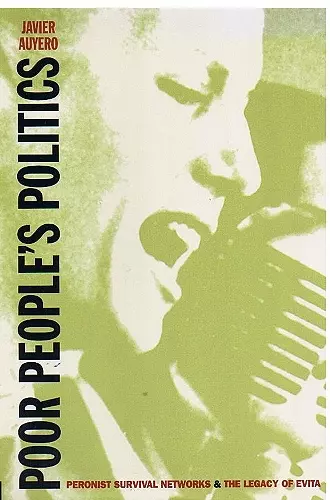Poor People's Politics
Peronist Survival Networks and the Legacy of Evita
Format:Hardback
Publisher:Duke University Press
Published:1st Jan '01
Currently unavailable, and unfortunately no date known when it will be back

Examines how Argentina's urban poor use political networks and informal webs of reciprocal help to solve their everyday survival needs
Revealing a deep familiarity with the lives of the urban poor in Villa Paraiso, a stigmatised and destitute shantytown of Buenos Aires, this book demonstrates the ways in which local politicians present their vital favors to the poor and how the poor perceive and evaluate these favours.“Political clientelism” is a term used to characterize the contemporary relationships between political elites and the poor in Latin America in which goods and services are traded for political favors. Javier Auyero critically deploys the notion in Poor People’s Politics to analyze the political practices of the Peronist Party among shantytown dwellers in contemporary Argentina.
Looking closely at the slum-dwellers’ informal problem-solving networks, which are necessary for material survival, and the different meanings of Peronism within these networks, Auyero presents the first ethnography of urban clientelism ever carried out in Argentina. Revealing a deep familiarity with the lives of the urban poor in Villa Paraíso, a stigmatized and destitute shantytown of Buenos Aires, Auyero demonstrates the ways in which local politicians present their vital favors to the poor and how the poor perceive and evaluate these favors. Having penetrated the networks, he describes how they are structured, what is traded, and the particular way in which women facilitate these transactions. Moreover, Auyero proposes that the act of granting favors or giving food in return for votes gives the politicians’ acts a performative and symbolic meaning that flavors the relation between problem-solver and problem-holder, while also creating quite different versions of contemporary Peronism. Along the way, Auyero is careful to situate the emergence and consolidation of clientelism in historic, cultural, and economic contexts.
Poor People’s Politics reexamines the relationship between politics and the destitute in Latin America, showing how deeply embedded politics are in the lives of those who do not mobilize in the usual sense of the word but who are far from passive. It will appeal to a wide range of students and scholars of Latin American studies, sociology, anthropology, political science, history, and cultural studies.
“At the level of most political science literature on urban poverty and clientelism, this work is genuinely pathbreaking. Combining the best of ‘thick description’ ethnography with a sense of more global processes at work in a society, Auyero uses the most up-to-date analytical frameworks to interrogate an object of study that has rarely—if ever—been so addressed. This is a book to be reckoned with over the next few years and beyond.”—Daniel James, author of Doña María’s Story: Life History, Memory, and Political Identity
“Other people write about patronage politics as a form of organization, as a scourge to eradicate, or as a necessary evil on the way to full democracy. Javier Auyero writes about it as a raucous, improvised, crucial way of surviving poverty and inequality. Reporting perceptive first-hand observations in playful, energetic prose, Auyero illuminates poor people’s politics in Argentina and elsewhere.”—Charles Tilly, Columbia University
ISBN: 9780822326274
Dimensions: unknown
Weight: 907g
272 pages